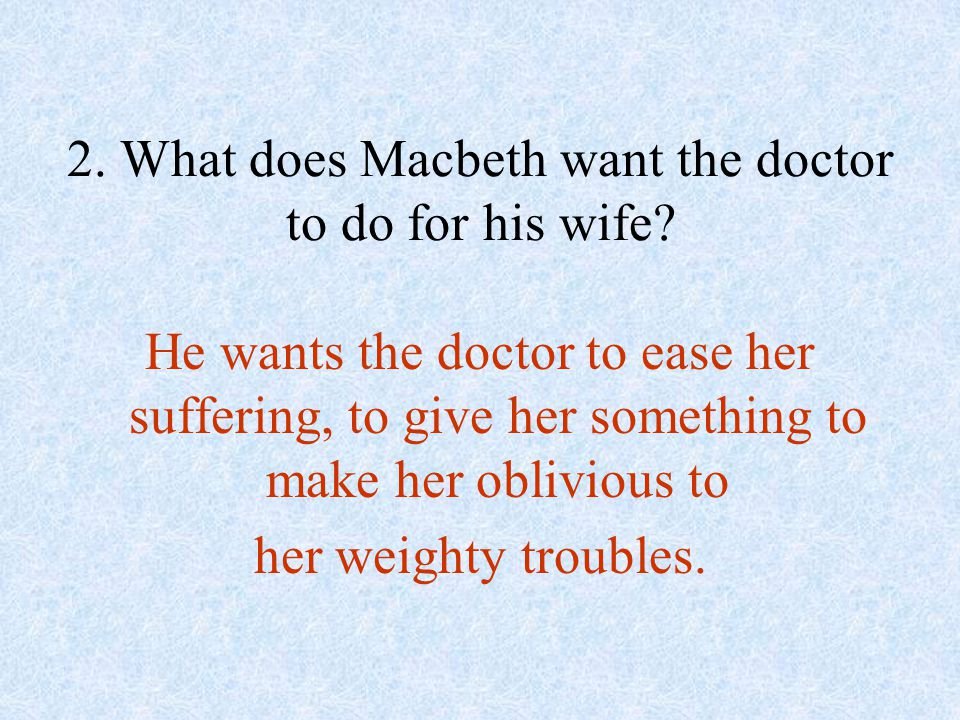Macbeth wants the doctor to heal his wife. He hopes the doctor can cure her mind.
But, it’s not that simple. In Shakespeare’s famous play, “Macbeth,” Lady Macbeth’s mental state deteriorates. She suffers from intense guilt and hallucinations. Macbeth, desperate and anxious, turns to the doctor for help. He wishes for a quick fix to her troubles.
Yet, mental health is complex, and Macbeth’s hopes may be too high. This request highlights his deep concern but also his misunderstanding of mental illness. It shows the tragedy of their situation. Dive into this blog to explore Macbeth’s plea and its implications. Understand the depth of his request and what it reveals about his character and the play’s themes.

Credit: slideplayer.com
Macbeth’s Desperation
In Shakespeare’s tragedy Macbeth, the titular character’s desperation reaches a peak when his wife, Lady Macbeth, falls ill. He seeks the help of a doctor, hoping to find a cure for her torment. Macbeth’s increasing anxiety reflects his growing instability and fear of losing control.
The King’s Plea
Macbeth pleads with the doctor to heal his wife. He wants her to be free of the mental anguish that plagues her. Lady Macbeth’s condition worries him deeply. He asks the doctor if he can “pluck from the memory a rooted sorrow,” highlighting his belief in the power of medicine to cure mental distress.
Important Keywords:
- Macbeth
- Lady Macbeth
- Doctor
- Desperation
- Anguish
Underlying Anxiety
Macbeth’s anxiety is evident in his conversation with the doctor. He is not only concerned about his wife’s health but also about his own fate. Lady Macbeth’s illness mirrors Macbeth’s own psychological turmoil. The more he tries to control his world, the more it slips away.
This scene shows Macbeth’s vulnerability. The once powerful king is now begging for help. His desperation is palpable and tragic. It serves as a stark contrast to his earlier confidence and ambition.
Key Takeaways:
| Aspect | Description |
|---|---|
| Macbeth’s Plea | Seeks a cure for Lady Macbeth’s mental anguish |
| Underlying Anxiety | Reflects his fear and vulnerability |

Credit: www.shakespeare.org.uk
Lady Macbeth’s Condition
Macbeth asks the doctor to cure Lady Macbeth’s troubled mind. He wants her to be free from guilt and sleep peacefully. He hopes the doctor can remove her mental suffering.
Lady Macbeth’s condition deteriorates rapidly. Her guilt and stress take a toll. Macbeth grows increasingly worried. He seeks help from a doctor. He hopes the doctor can cure her. But her symptoms are complex and troubling.Sleepwalking Symptoms
Lady Macbeth starts sleepwalking. She moves around at night. She acts out her fears and guilt. The sleepwalking is disturbing. It reveals her troubled mind. She often tries to wash her hands. She imagines bloodstains that never disappear. This behavior alarms everyone around her.Mental Turmoil
Lady Macbeth’s mind is in turmoil. She is haunted by her actions. She cannot find peace. Her mental state worsens. She speaks in fragmented sentences. She reveals her deep regrets. The doctor observes her closely. He realizes her problems are beyond physical. Her mental anguish is severe. Macbeth feels helpless. He wants her to be well again. “`Role Of The Doctor
Macbeth wants the doctor to cure Lady Macbeth’s troubled mind. He hopes the doctor can erase her disturbing thoughts. Her mental health worries him deeply.
The doctor in Shakespeare’s “Macbeth” plays a small but vital role. He is called upon by Macbeth to attend to Lady Macbeth’s troubling mental state. His presence highlights the limits of medical knowledge during the era. The doctor represents the struggle to understand and treat psychological issues in a time dominated by superstition and limited medical practices.Initial Observations
The doctor first observes Lady Macbeth sleepwalking. She reveals her deep guilt and torment through her actions. He listens as she speaks of the murders she has been part of. The doctor is shocked by her confessions. He realizes that her mind is deeply troubled. His initial observations lead him to understand that her condition is beyond simple treatment.Professional Limitations
The doctor admits his limitations to Macbeth. He cannot cure Lady Macbeth’s mind. He suggests that her problems are more spiritual than physical. This shows the limitations of medical practices at the time. The doctor believes that only divine intervention can help her now. He feels helpless and unable to provide a solution. His role underlines the theme of human limitations in the face of overwhelming guilt and madness. “`Macbeth’s Expectations
In William Shakespeare’s Macbeth, the protagonist faces many challenges. One of the most personal is his wife’s mental decline. Macbeth’s expectations from the doctor reveal his desperation and concern.
Seeking A Cure
Macbeth turns to the doctor with high hopes. He wants a cure for Lady Macbeth’s illness. He believes the doctor can use his skills to fix her mind.
Macbeth says, “Canst thou not minister to a mind diseas’d?” This shows his belief in the doctor’s power. He wants an easy solution, a simple fix for her troubled mind.
Demand For Solutions
Macbeth’s demands are clear and urgent. He asks the doctor to “Pluck from the memory a rooted sorrow.” He expects the doctor to remove the pain and guilt from Lady Macbeth’s mind.
He also says, “Raze out the written troubles of the brain.” He wants her to forget her guilt and return to normal. Macbeth’s expectations are unrealistic. He does not understand the depth of her mental troubles.
His demands show his desperation. He is willing to try anything to save his wife. This highlights the tragic nature of their situation.
Medical Knowledge In Shakespeare’s Time
In Shakespeare’s time, medical knowledge was limited. People relied on basic treatments. Many believed in superstitions. Medical practices were not advanced. This context is important when understanding Macbeth’s plea to the doctor.
Historical Context
During the 16th and 17th centuries, medicine was primitive. Most doctors had little formal education. They learned through apprenticeships. Medical schools were rare. The medical field was based on ancient theories.
People believed in the four humors: blood, phlegm, yellow bile, and black bile. An imbalance in these caused illness. Treatments aimed to restore balance. Common methods included bloodletting and purging.
Superstition played a huge role. Many believed diseases were punishments from God or caused by evil spirits. This influenced treatments. Doctors used charms and prayers as remedies.
Limitations Of Medicine
Medical knowledge had many limitations. Doctors lacked understanding of infections and germs. They did not know about bacteria or viruses. Surgical procedures were crude and painful.
There were no antibiotics or advanced painkillers. Patients often died from simple infections. Childbirth was risky for both mother and child. Mental health issues were poorly understood. People with mental illnesses faced stigma and were often mistreated.
Doctors used herbs and plants for healing. Some remedies were effective, but many were not. Treatments were based on trial and error. There was no scientific method.
In Macbeth, the doctor cannot cure Lady Macbeth. He admits his limitations. He suggests that only God or a priest can help her. This reflects the era’s medical constraints.
Symbolism Of Illness
In Shakespeare’s Macbeth, illness carries deep symbolic meaning. Lady Macbeth’s illness reflects more than just physical symptoms. It symbolizes guilt, ambition, and the unraveling of her sanity. This symbolism adds depth to the play’s themes and characters.
Manifestation Of Guilt
Lady Macbeth’s illness is a manifestation of her guilt. She sleepwalks and constantly tries to wash imaginary blood from her hands. This behavior shows her deep-seated remorse for her role in King Duncan’s murder. The doctor observes her actions and realizes her mind is troubled by heavy guilt.
Macbeth wants the doctor to cure her. He hopes a physical remedy can heal her mental anguish. This highlights his misunderstanding of the true nature of her illness. He cannot see that her guilt is beyond medical treatment.
Reflection Of Ambition
Her illness also reflects their unchecked ambition. Lady Macbeth pushed Macbeth to seize the throne. Her ambition led to their downfall. The illness symbolizes the destructive nature of their desires. It shows how their unchecked ambition corrupted their minds and lives.
Macbeth’s plea to the doctor reveals his desperation. He seeks to fix what their ambition has broken. But, the doctor’s inability to help underlines the irreversible damage caused by their ambition.
In summary, the symbolism of illness in Macbeth is powerful. It reveals deep truths about guilt and ambition. It shows how these feelings can manifest physically and mentally. And it highlights the tragic consequences of unchecked desires.
Doctor’s Diagnosis
In Shakespeare’s tragedy Macbeth, the protagonist seeks help for his troubled wife. He turns to a doctor, desperate for a cure. The doctor’s diagnosis reveals much about Lady Macbeth’s condition and the limits of medicine during that era.
Assessment Of Symptoms
The doctor carefully examines Lady Macbeth’s symptoms. She is observed sleepwalking and muttering to herself. Her hands constantly rub together, as if trying to wash something away. These behaviors suggest deep psychological distress. The doctor listens to her words and notes her guilt-ridden state. He understands that her mind is troubled by unseen wounds.
Advice To Macbeth
The doctor offers his advice to Macbeth. He explains that Lady Macbeth’s condition goes beyond physical ailments. Her illness stems from a troubled mind. He suggests that only divine intervention can heal her. The doctor admits his limitations, indicating that some illnesses cannot be treated with medicine. He advises Macbeth to seek spiritual help for his wife.
Impact On Macbeth
Macbeth wants the doctor to cure his wife’s troubled mind. He hopes for a remedy to ease her guilt. Macbeth desires a quick solution to restore her peace.
Realization Of Helplessness
Upon seeking the doctor’s assistance for his wife, Macbeth’s vulnerability becomes evident.
The realization of his inability to cure her himself weighs heavily on his conscience.
Descent Into Madness
As Lady Macbeth’s condition worsens, Macbeth’s descent into madness accelerates.
The doctor’s inability to provide a remedy further fuels Macbeth’s growing despair.

Credit: www.telegraph.co.uk
Frequently Asked Questions
What Does Macbeth Request From The Doctor?
Macbeth asks the doctor to cure Lady Macbeth’s mental illness. He wants her to be free from her troubled thoughts and guilt.
Why Does Lady Macbeth Need A Doctor?
Lady Macbeth needs a doctor because she is experiencing severe psychological distress. Her guilt over past actions is causing her great mental anguish.
How Does The Doctor Respond To Macbeth’s Request?
The doctor tells Macbeth that Lady Macbeth’s condition is beyond medical help. He suggests that only she can heal herself.
What Is The Doctor’s Diagnosis Of Lady Macbeth?
The doctor diagnoses Lady Macbeth with a troubled mind. He believes her condition is due to deep-seated guilt and anxiety.
Conclusion
Macbeth desperately wants the doctor to cure his wife. He seeks relief for her troubled mind. Her sleepwalking and guilt consume her. Macbeth feels powerless. He hopes for a medical solution. The doctor, however, admits he cannot help. This leaves Macbeth more isolated and desperate.
His wife’s condition symbolizes the chaos in his life. Macbeth’s struggles show the tragic consequences of his actions. Understanding his plea to the doctor reveals his deep despair and helplessness.






